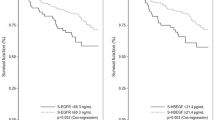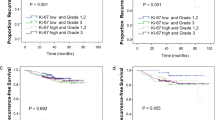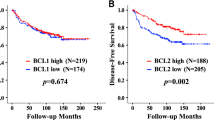Abstract
The epidermal growth factor receptor (EGFR) is a transmembrane glycoprotein whose expression is important in the regulation of breast cancer cell growth. The relationship between EGFR status (determined by an immunocytochemical assay) and various prognostic factors was investigated in 164 primary breast cancers. Overall 56% of tumours were EGFR-positive and the expression of EGFR was unrelated to axillary node status, tumour size and histological grade; and it was poorly associated with the tumour proliferative activity measured by Ki-67 immuno-cytochemistry. The relapse-free survival (RFS) probability at 3-years was significantly worse for patients with EGFR positive tumours (P = 0.003) and for those whose Ki-67 score was > 7.5% (P = 0.0027), as well as in patients with axillary node involvement (P = 0.01) and with poorly differentiated tumours (P = 0.04). Immunocytochemical determination of EGFR and cell kinetics gave superimposable prognostic information for predicting RFS with odds ratios of 3.51, when evaluated singly. In our series of patients EGFR, Ki-67 and node status retain their prognostic value concerning RFS in multivariate analysis. The 3-year probability of overall survival (OS) was significantly better in node-negative patients (P = 0.04) and was similar in EGFR-positive and negative patients. In conclusion, EGFR status appears to be a significant and independent indicator of recurrence in human breast cancer and the concomitant measurement of the tumour proliferative activity seems to improve the selection of patients with different risks of recurrence.
This is a preview of subscription content, access via your institution
Access options
Subscribe to this journal
Receive 24 print issues and online access
$259.00 per year
only $10.79 per issue
Buy this article
- Purchase on Springer Link
- Instant access to full article PDF
Prices may be subject to local taxes which are calculated during checkout
Similar content being viewed by others
Author information
Authors and Affiliations
Rights and permissions
About this article
Cite this article
Gasparini, G., Bevilacqua, P., Pozza, F. et al. Value of epidermal growth factor receptor status compared with growth fraction and other factors for prognosis in early breast cancer. Br J Cancer 66, 970–976 (1992). https://doi.org/10.1038/bjc.1992.394
Issue Date:
DOI: https://doi.org/10.1038/bjc.1992.394
This article is cited by
-
Synthesis and evaluation of radioiodinated phenoxyquinazoline and benzylaminoquinazoline derivatives as new EGF receptor tyrosine kinase imaging ligands for tumor diagnosis using SPECT
Annals of Nuclear Medicine (2012)
-
Ki-67: level of evidence and methodological considerations for its role in the clinical management of breast cancer: analytical and critical review
Breast Cancer Research and Treatment (2012)
-
Ki-67 as prognostic marker in early breast cancer: a meta-analysis of published studies involving 12 155 patients
British Journal of Cancer (2007)
-
Expression of EGFR, C-erbB-2 proteins in breast cancer and their relation with micrometastasis in bone marrow
The Chinese-German Journal of Clinical Oncology (2003)
-
Signal transduction in mammary tumorigenesis: a transgenic perspective
Oncogene (2000)



